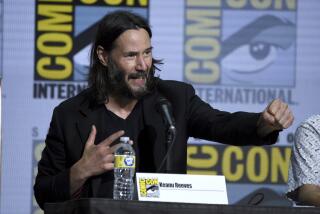Four-Wheel Drive : MERRY MEN, <i> By Carolyn Chute (Harcourt, Brace: $24.95; 695 pp.)</i>
- Share via
Approaching this novel to review, I felt something like a Peace Corps volunteer arriving at a bad patch of world real estate in need of international help. Name of the spot is Egypt, not an African country but an American town, not the one in Georgia or Mississippi or New York, but the one in southwestern Maine. Not that there is much acreage in that part of the state where it meets New Hampshire and the Atlantic Ocean. Not that you can find it in the gazetteer at the back of the National Geographic Atlas of the World. But surely an entry in the next edition of the Dictionary of Imaginary Places.
In one sense, Egypt is an Erewhon of a place, a made-up No-wheres-ville inhabited by people who are economically depressed, profoundly moral, wildly funny, extremely fertile, work- and family-oriented, with little education and with none of what the world calls sophistication. Anglo-Celtic stock, really, with names like Bean, Fogg, Cole, Plummer, Johnson, Anderson, Dougherty, Barrington. Yeomanry of the sort that has won all of the just wars in this century but that in peacetime has been all but forgotten in the congresses and parliaments.
In another sense, Erewhon is not, as it was in Samuel Butler’s novels, a utopia where the enemy--the enemy that had to be destroyed--was the machine. Happiness in this Egypt is associated with machinery, at least the four-wheeled kind, where humankind is at one with pickups and backhoes, Mercs and Trans Ams, Fords and Chevys, an occasional Volvo, a solo Saab. Wheels--including Harleys--are, it seems, the heartbeat of Egypt, if the advertising slogan of one species can be made to stand for the genus.
The Homer of these Egyptians is Carolyn Chute, happily remembered for two previous novels, “The Beans of Egypt, Maine” and “Letourneau’s Used Auto Parts.” According to a CBS-TV profile, she lives where and what she writes. She has wild hair, wears comfortable clothes and moves about in boots. She dropped out of high school at age 16 to have her daughter. She’s 46 years old now, on her second marriage, this time to a man who, like many of the rugged men in her novels, can’t read or write. And she has three grandchildren to crow about.
“There are not many writers in the United States who can live on just their writings,” she told the television interviewer. Shacks and trailers dot her real, as well as her literary, landscape. With her book and film earnings, she has built a comfortable house for her family; the convenience, though, is inconvenient; it’s not in the house; it’s in the outhouse out back, and it’s unheated; but she does have a snow-blower.
To follow but one character in her epic novel is to begin with Lloyd Barrington who is 8 3/4 at novel’s start and by novel’s end is 40ish-going-on-60ish. As a boy he fantasized that he was Super Tree Man; at night, when the rest of his family was asleep, he donned a comic-book cape and capered about Egypt planting trees. As a mature man he is a wounded, festering worker-thinker, occasionally spouting speeches that sound like a Shavian character mouthing off against munitions factories in a windy play of ideas at the turn of the century.
Paris of this epic--that is to say, the pretty-boy villain--is the corporation (agribusiness is singled out by the author in her dedication) that has bled dry Egypt’s dark-veined men like Lloyd, who during the course of the novel lose their businesses, their homes, their money, their children. To survive with their families and maintain some natural dignity, some of them--at least Lloyd--have resorted to some Robin Hood-like strategies.
The straw that breaks the camel’s back in Egypt is the selling to an anonymous buyer of 16,000 acres, which amounts to half the town. Condition of the sale is the closing of the paper mill on that property. For the townspeople that means, again according to the author in her dedication, “welfare lines, prisons, or the slavery of Big Business.” Retribution extracted by the not-so-merry men of Egypt is swift, bizarre, sophisticated. Like all such acts, it’s symbolically satisfying, but ultimately it’s ineffectual, save for sending one female character--albeit a middle-class one--to the psychiatric ward.
“Merry Men” is altogether a successful novel, creating as it does a real world with real characters involved in life-and-death issues, giving authentic voice to a segment of American society that has had little representation in the Knesset of the novel.
But after three books, time is running out for the author. Her original style and sprawling narrative are laced with inconsistencies, even within the guidelines set down by the novelist herself. Sooner or later middle-classic critics--mean-minded men and women who get paid to make authors miserable--will run out of patience.
“Merry Men” is not a book for the people Chute writes about; at $24.95 most can’t afford it; at 600-plus pages, few can read it, even though it’s composed in their own lingo. It’s a book for middle-class readers who are employed, many of them, by the sort of corporation Chute excoriates--readers who not only have been educated to support the idea of the novel in general but also have the discretionary funds to keep the genre in headbands and foot bands. Is there a message in “Merry Men” for them?
“I don’t see much difference between human beings . . . lower classes and higher classes,” Chute told the television interviewer. “I see everybody doing their best to get through the day.”
That echoes the sentiment of the middle-class character whose bell was rung at the end of the novel; shortly before that, she was trying to drum some sense into the head of that quintessential Egyptian, Lloyd Barrington, who did go to college and majored in sociology.
“You know that just being alive, one has to face daily trials. Some people just pretend well, Lloyd. . . . Believe me, please, all people aren’t what they seem.”
More to Read
Sign up for our Book Club newsletter
Get the latest news, events and more from the Los Angeles Times Book Club, and help us get L.A. reading and talking.
You may occasionally receive promotional content from the Los Angeles Times.










